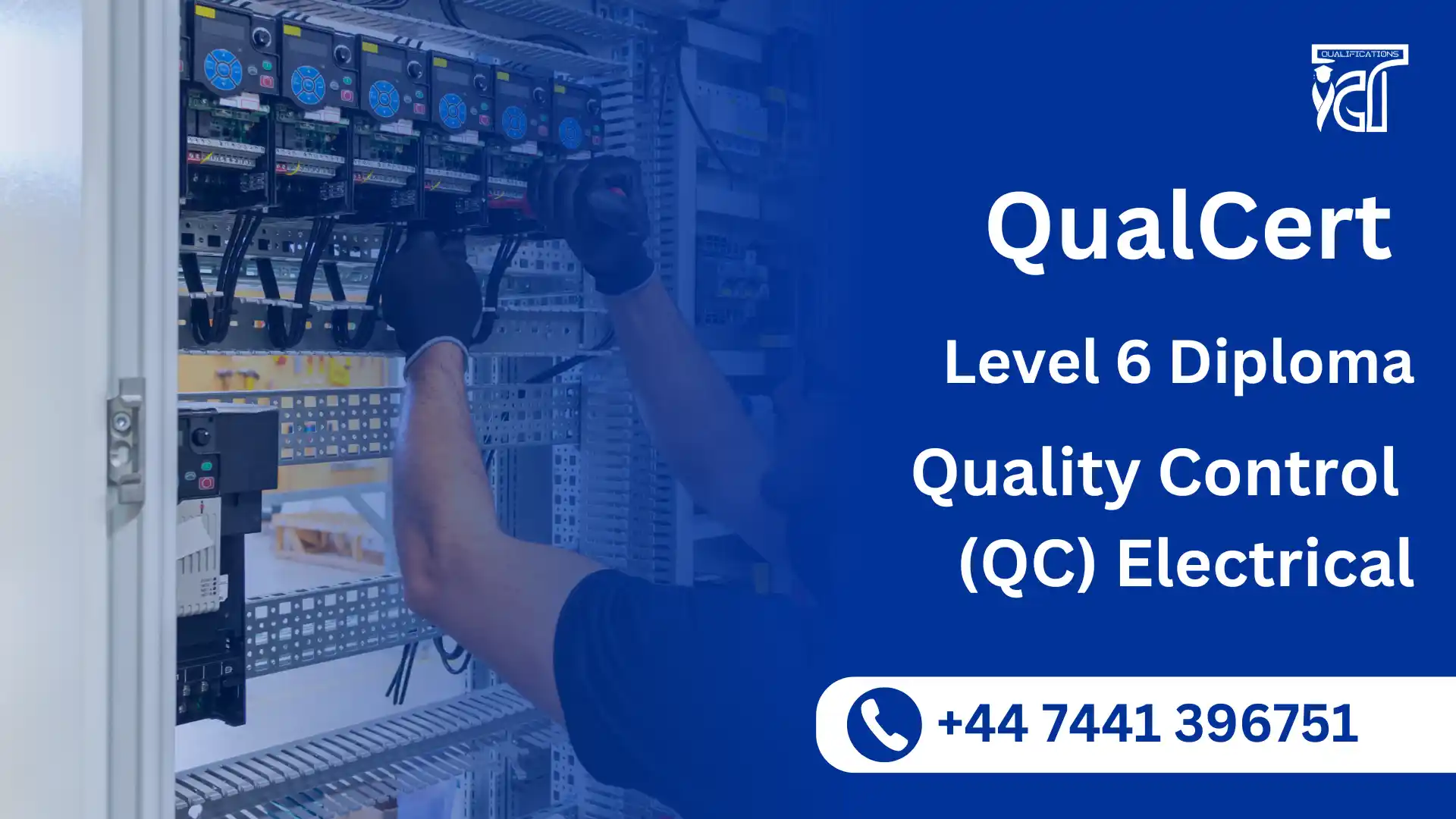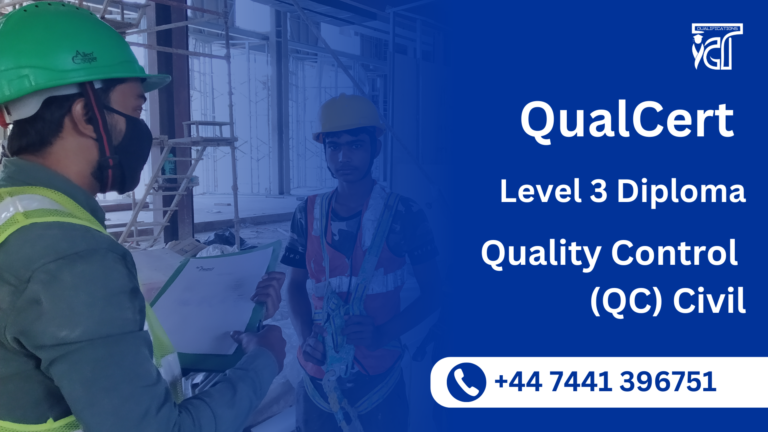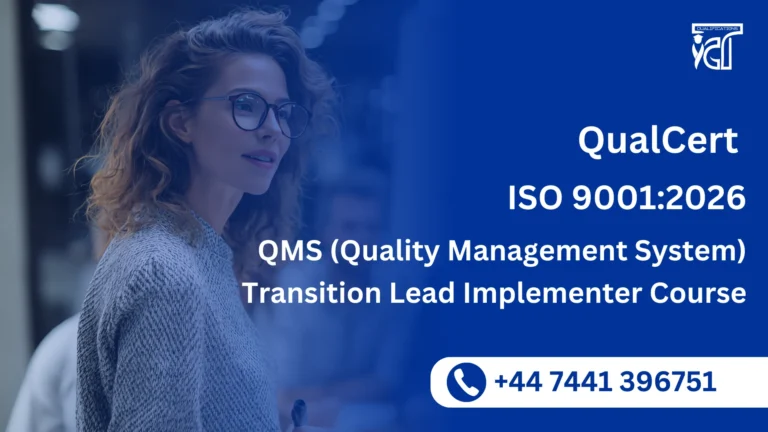The QualCert Level 6 Diploma in Quality Control (QC) – Electrical is a specialized qualification designed to equip learners with the knowledge, skills, and competencies required to manage and implement quality control practices in electrical engineering environments. This diploma bridges the gap between technical electrical knowledge and effective quality assurance methods, preparing professionals to ensure safety, reliability, and compliance across electrical systems and installations.
Through a comprehensive curriculum, learners will explore essential areas such as quality planning, inspection techniques, standards compliance, system testing, and quality documentation. The course also emphasizes the practical application of QA/QC procedures in real-world electrical projects, enabling learners to confidently oversee quality performance from planning to execution.
Ideal for technicians, supervisors, inspectors, and mid-level engineers, this diploma helps build a solid foundation in quality control while supporting career advancement into more senior roles in the electrical and engineering sectors.
QualCert Level 6 Diploma in Quality Control (QC) Electrical
The QualCert Level 6 Diploma in Quality Control (QC) Electrical comprises several study units designed to provide learners with a comprehensive understanding of QC principles and practices in the electrical sector. Below is the qualification structure, including the Total Qualification Time (TQT) 1200, Guided Learning Hours (GLH) 600, and 120 Credits associated with the program.
| Unit Ref# | Unit Title | Credit | GLH | TQT |
| QC100012 – 1 | Mastering Electrical Quality Control | 20 | 100 | 200 |
| QC100012 – 2 | Advanced Electrical Circuit Testing | 20 | 100 | 200 |
| QC100012 – 3 | Electrical Calibration and Standards Compliance | 20 | 100 | 200 |
| QC100012 – 4 | Electrical Quality Control Project Management | 20 | 100 | 200 |
| QC100012 – 5 | Health and Safety Risk Assessment in Electrical Engineering | 20 | 100 | 200 |
| QC100012 – 6 | Quality Control and Assurance Reporting | 20 | 100 | 200 |
GLH (Guided Learning Hours) and TQT (Total Qualification Time) are terms commonly used in vocational qualifications to help define the amount of time a learner is expected to spend on their studies.
1. GLH (Guided Learning Hours)
GLH refers to the number of hours a learner spends being directly taught, supervised, or supported during their course. This includes the time spent in activities such as:
- Classroom instruction
- Practical workshops
- One-on-one tutoring or mentoring sessions
- Online learning sessions with tutor support
In other words, GLH represents the time that learners are actively engaged with their instructors or learning activities.
2. TQT (Total Qualification Time)
TQT represents the total amount of time a learner is expected to invest in completing a qualification, including:
- GLH (Guided Learning Hours): Time spent on direct learning, as explained above.
- Self-Directed Learning: This includes time spent on independent study, research, assignment completion, preparation for exams, and any other work the learner does outside of direct teaching hours.
TQT is a broader measure that includes all the time required to achieve the qualification. It helps learners and employers understand the overall commitment required for the qualification.
Key Differences Between GLH and TQT:
- GLH focuses on direct learning with guidance or supervision.
- TQT includes GLH as well as independent study time and other learning-related activities.
Example:
If a qualification has a TQT of 600 hours and a GLH of 250 hours, it means the learner should spend 250 hours in direct learning (classroom, online, or tutor-led sessions) and 350 hours on independent study or research.
1. Mastering Electrical Quality Control
- Develop an in-depth understanding of key quality control principles and procedures in electrical engineering.
- Build the ability to identify, analyze, and resolve quality-related issues in electrical systems and components.
- Implement industry-recognized quality control protocols across installation, testing, and maintenance processes.
- Strengthen skills in evaluating the performance and compliance of electrical systems.
2. Advanced Electrical Circuit Testing
- Gain expertise in advanced techniques for testing and evaluating electrical circuits.
- Learn to operate specialized diagnostic tools and instruments with precision.
- Master fault detection and troubleshooting methods for diverse circuit conditions.
- Understand circuit behavior under load, varying conditions, and in compliance with safety standards.
3. Electrical Calibration and Standards Compliance
- Understand the critical role of calibration in ensuring accurate and reliable electrical measurements.
- Acquire practical skills in calibrating instruments and maintaining system precision.
- Learn how to align testing and calibration practices with local and international standards (e.g., IEC, ISO).
- Apply industry standards to enhance compliance and system accountability.
4. Electrical Quality Control Project Management
- Develop project management skills specific to electrical quality control activities.
- Learn to plan, organize, and execute quality assurance processes within engineering projects.
- Effectively allocate resources, manage schedules, and maintain quality timelines.
- Lead quality control teams and communicate progress and issues in a project environment.
5. Health and Safety Risk Assessment in Electrical Engineering
- Understand workplace health and safety regulations relevant to electrical systems.
- Conduct detailed risk assessments to identify and mitigate potential electrical hazards.
- Create and implement effective safety protocols for electrical installations and maintenance.
- Strengthen the ability to audit safety procedures and ensure regulatory compliance.
6. Quality Control and Assurance Reporting
- Learn best practices for documenting and reporting quality assurance activities.
- Produce accurate, structured, and comprehensive QC/QA reports.
- Communicate inspection outcomes, corrective actions, and recommendations clearly to stakeholders.
- Utilize modern reporting tools and techniques to support decision-making and accountability.
Industry-Relevant Skills
Gain practical and theoretical knowledge tailored to current industry demands in electrical quality control, making you job-ready from day one.
Improved Career Prospects
Enhance your qualifications for roles such as Electrical QC Inspector, QA/QC Engineer, Calibration Technician, or Site Supervisor in electrical projects.
Strong Foundation in Compliance and Standards
Understand and apply national and international standards (e.g., IEC, ISO) to ensure safety, accuracy, and regulatory compliance in electrical systems.
Hands-On Training in Testing and Calibration
Learn to use industry-standard tools and equipment for testing, fault diagnosis, and calibration, improving your technical proficiency.
Project Management Competence
Develop the skills to manage quality control tasks within larger electrical projects, including resource planning, reporting, and team coordination.
Enhanced Safety Awareness
Acquire the ability to identify electrical risks, conduct health and safety assessments, and implement workplace safety protocols effectively.
Recognition and Professional Credibility
Earn a widely respected qualification that enhances your credibility with employers, clients, and project stakeholders.
Opportunities for Advancement
Position yourself for promotions or more specialized roles in electrical engineering, quality management, or system compliance.
Pathway to Further Study
This diploma can serve as a stepping stone to advanced qualifications, such as the Level 7 Diploma in Quality Control or other professional certifications in QA/QC or electrical engineering.
Applicable Across Sectors
Applicable in diverse industries including construction, manufacturing, power generation, utilities, oil & gas, and industrial automation.
The QualCert Level 6 Diploma in Quality Control (QC) – Electrical is designed for individuals who have a technical background and are looking to advance their expertise in electrical quality control. This course is ideal for:
- Electrical Engineers and Technicians
Professionals seeking to specialize in quality assurance and quality control practices within electrical projects. - QA/QC Inspectors and Supervisors
Individuals already working in quality roles who want to enhance their skills in electrical systems testing, compliance, and reporting. - Site Engineers and Project Coordinators
Those responsible for overseeing electrical installations and ensuring that work meets required standards and specifications. - Maintenance and Calibration Technicians
Learners looking to upgrade their knowledge in system calibration, diagnostics, and testing of electrical equipment. - Diploma or Degree Holders in Electrical/Electronic Engineering
Graduates aiming to strengthen their qualifications with a focus on practical, industry-recognized QC methods. - Health and Safety Officers in Engineering Projects
Professionals who need a solid understanding of electrical hazards and risk assessments as part of their safety responsibilities. - Individuals Seeking Career Progression in QA/QC
Those aiming for mid-level roles in quality management, electrical compliance, or project leadership within technical environments.
Entry Requirements
Register Now
Qualification Process
Qualification Process for the QualCert Level 6 Diploma in Quality Control (QC) Electrical
- Self-Assessment:
Begin by evaluating your eligibility to ensure you meet the qualification requirements, including work experience, knowledge, and language proficiency. - Registration:
Complete your registration by submitting the required documents, including a scanned copy of a valid ID, and paying the registration fee. - Induction:
An assessor will conduct an induction to confirm your eligibility for the course and explain the evidence requirements. If you do not meet the criteria, your registration will be canceled, and the fee will be refunded. - Assignmnets & Evidence Submission:
Provide all assignmnets and the necessary evidence based on the assessment criteria outlined in the course. If you are unsure of the required evidence, consult with the assessor for guidance on the type and nature of evidence needed. - Feedback and Revision:
The assessor will review your submitted evidence and provide feedback. Evidence that meets the criteria will be marked as “Criteria Met,” while any gaps will be identified. You will be asked to revise and resubmit if needed. - Competence Evidence:
Submit final evidence demonstrating that all learning outcomes have been met. This evidence will be marked as “Criteria Met” by the assessor once it is satisfactory. - Internal Quality Assurance (IQA):
The Internal Quality Assurance Verifier (IQA) will review your evidence to ensure consistency, quality, and compliance with standards. - External Verification:
The IQA will submit your portfolio to QualCert External Quality Assurance Verifiers (EQA) for final confirmation. The EQA may contact you directly to verify the authenticity of your evidence. - Certification:
Upon successful completion of all checks, QualCert will issue your official certificate, confirming that you have attained the QualCert Level 6 Diploma in Quality Control (QC) Electrical.







